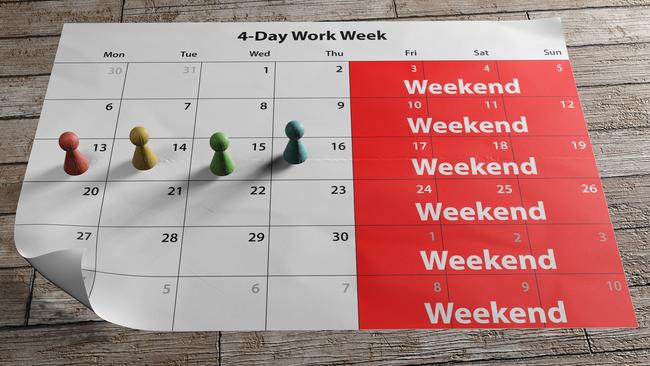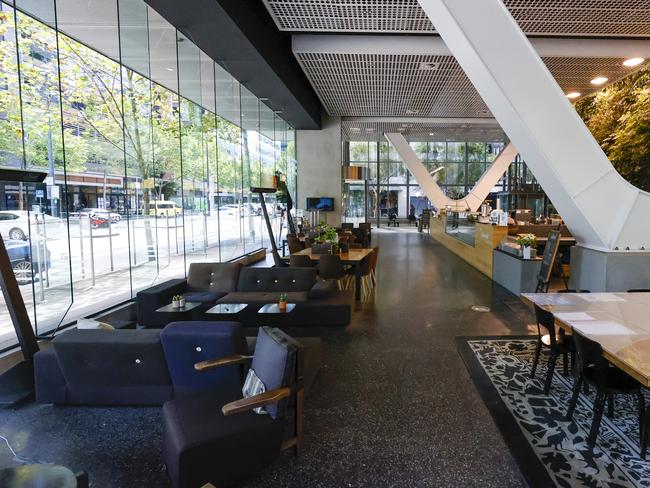‘We’ve had this for over a century’: Overwhelming success for Aussie companies switching to four-day work week
The concept of a four-day work week has long captured the attention of Australians. Now, 10 companies have revealed the truth behind the revolution.

At Work
Don't miss out on the headlines from At Work. Followed categories will be added to My News.
The concept of a four-day work week has long captured the attention of Australians for good reason.
While most people eagerly await the occasional long weekend, there are a fortunate few who now experience a shortened work week regularly.
A select number of organisations Down Under have already embraced the 100:80:100 model, where employees retain 100 per cent of their pay for five days while working only 80 per cent of their former hours, provided they maintain 100 per cent productivity.
As technology develops at an exponential pace, the output of the average worker has soared compared to past decades, prompting a need to adapt the typical model of work life to promote wellbeing, flexibility and longevity in the role.
This innovative four-day model has gained considerable global recognition, with previous reports hailing successful trials in countries like Iceland and the United Kingdom.
However, businesses have been approaching these findings with a critical eye, with many sceptical studies exaggerating the outcomes or overlooked complex factors that could hinder the scalability of this model.
Swinburne University of Technology recently delved into the realities of the four-day work week in Australia, conducting a survey involving 10 organisations that have implemented the model.
He said improving the wellbeing of workers is a major factor, making clear that “burnout is a real thing”.
“The way that most of us work – this five-day week with two day’s rest – we’ve had this for over a century now,” Professor Hopkins said on 2GB radio this morning.
“Not much has changed in terms of the way we work, but so much else has changed. Things like technology have come along that have really saved us more time. But we don’t benefit from that saved time, we just do more work.
“So we’re still working the same amount of hours, but fitting in a lot more into those hours. I think that is one of the main causes of burnout.”
Earlier this year, hardware giant Bunnings announced it would be the first Australian retailer to trial the four-day week for thousands of its full-time workers, with the hardware giant announcing it had made a landmark agreement in May.
The agreement with Shop, Distributive and Allied Employees Association (SDA) delegates will also entitle Bunnings’ staff to pay rises over the next three years and more holidays.

Professor Hopkins said he interviewed senior managers from a number of Aussie organisations to understand the benefits and challenges they encountered after taking the dive.
“Results do reflect a management perspective,” he said in a piece for The Conversation.
“But what they told us suggests the four-day work week can successfully deliver positive outcomes for both employers and employees across a range of different industries.”
Out of the 10 organisations surveyed, four have permanently adopted the model following successful trials, while the remaining six have extended their trials without making a formal commitment yet.
Although there may be other organisations using the 100:80:100 model, Professor Hopkins said he made efforts to ensure the comprehensiveness of the survey. Four of the companies were part of global studies previously mentioned, while the remaining six devised their own pilot programs.
All the organisations included in the research belong to the private sector. Two are management consulting firms, and the others operate in sectors such as shipping/logistics, recruitment, marketing, mental health coaching, software development, creative design, healthcare, and management training.
Six of the companies are classified as small businesses, with fewer than 20 employees, while the remaining four fall into the medium-sized category, employing between 20 and 199 individuals.
In each case, these initiatives were spearheaded by management as strategies to combat employee burnout, boost productivity, and attract and retain talent in a highly competitive labour market.

However, Hopkins explained businesses weren’t solely motivated by the boost in output.
“Productivity isn’t all of it. Others went into it for totally different reasons, like attracting talent,” he said.
“There is quite a tight talent market out there, so they saw this as an opportunity to compete on salary with larger firms.”
EES Shipping, a medium-sized logistics company based in Perth, said they implemented a four-day work week trial in July 2022, citing intense pressure on global and local supply chains.
“We were starting to see cracks within the industry,” managing director Brian Hack said.
“People were burning out, truck drivers were just walking out the door, and I really didn’t want to see that happen here.”
Remarkably, three out of the 10 managers reported no decline in productivity despite the 20 per cent reduction in working hours, effectively making their staff more productive.
The other seven managers even witnessed an increase in productivity compared to the previous set up.
Additionally, six organisations identified improved recruitment and retention as the most significant successes resulting from the four-day work week, while five highlighted notable reductions in sick leave.
“We’re talking figures like a 60 per cent improvement on sick days,” Hopkins said.
Three companies managed to maintain their previous level of availability for customers and clients despite their staff working 20 per cent fewer hours. This exemplifies that “client-facing” organisations can successfully implement the four-day work week.

According to internal surveys and anecdotal evidence, employees expressed feeling more relaxed and re-energised due to the extra day off each week.
These findings hold particular significance given the record levels of stress and burnout prevalent in Australian workplaces.
The four-day work week revolution has already been pushed forward in parts of Europe.
In 2022, it was announced that workers in Belgium would be given the right to work a four-day week without sacrificing a full-time salary as part of a major overhaul to the European country’s labour laws.
The compressed 38-hour working week means that employees will work longer hours each day in order to make up the extra day off.
Workers in both the private and public sector will be able to request to transition to the four-day work structure, and if rejected, bosses will need to justify their refusal in writing.
The new rule has been offered in a package that also includes the ‘right to disconnect’ – meaning workers won’t have to answer calls or emails outside of work hours.
Similar rules have also become law in France, Ireland, Germany and Italy.
Originally published as ‘We’ve had this for over a century’: Overwhelming success for Aussie companies switching to four-day work week





